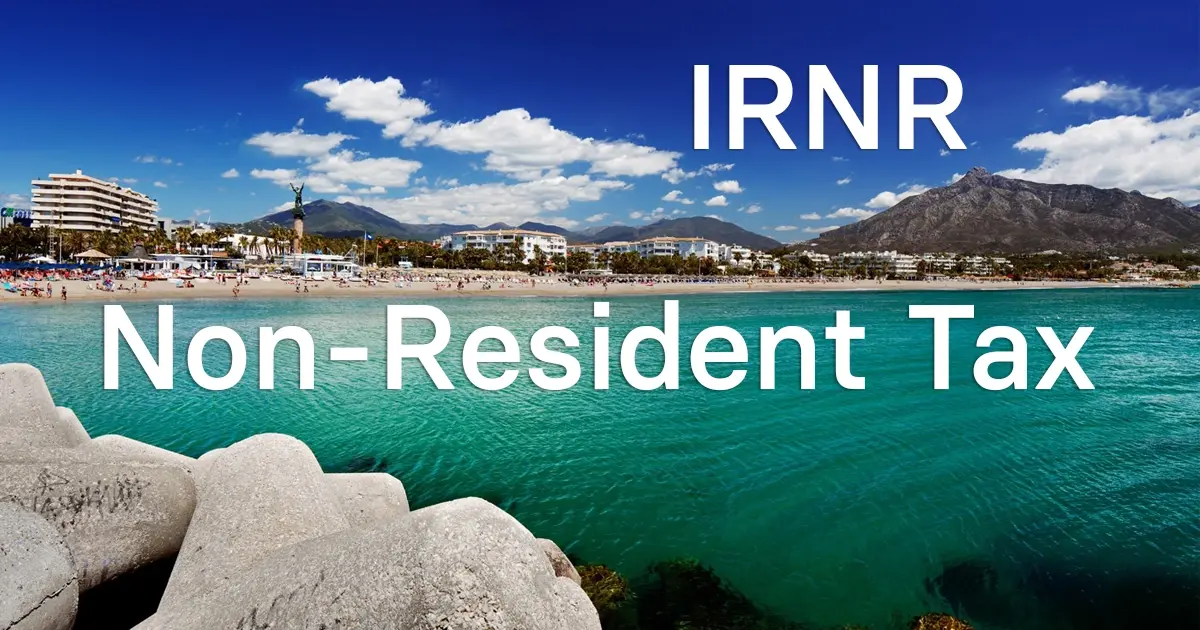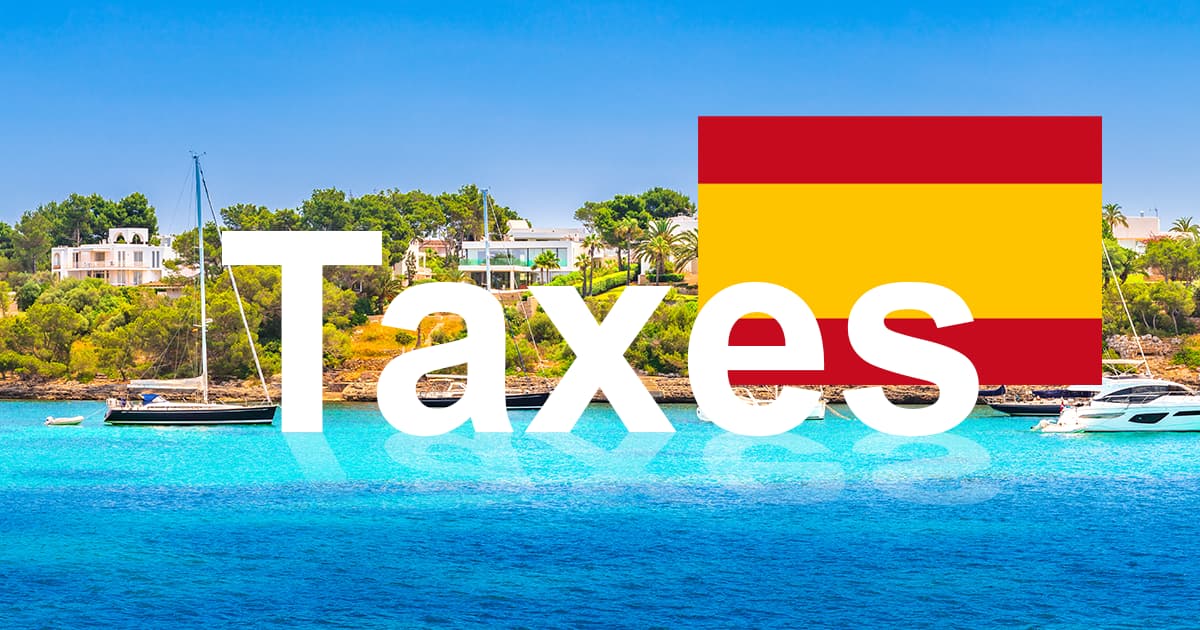
Non-Resident Tax (IRNR) in Spain – 2025 Guide
Last update: September 3, 2025
Reading time: 16 min
No Time to Read It All? Here’s the Quick Summary:
The IRNR (Non-Resident Income Tax) applies to anyone who owns property in Spain but is not a tax resident. It must be paid annually — even if the property is not rented out. For non-rented homes, tax is calculated on a deemed income based on the cadastral value. EU/EEA residents are taxed at 19%, others at 24%. Rented properties require quarterly filings and allow deductions (EU/EEA only). Filing is done via Modelo 210 through Spain’s tax agency. Penalties apply for late or missing declarations. SpainEasy Support offers full filing assistance in English, French, and Spanish.
What Is IRNR and Who Needs to Pay It?
IRNR stands for Impuesto sobre la Renta de No Residentes — Spain’s Non-Resident Income Tax. It is a state-level tax applied to individuals and legal entities who are not tax residents in Spain but earn income within Spanish territory. This includes foreigners who own real estate in Spain, even if they don’t rent it out.
If you are a non-resident property owner, you are required to declare income related to that property — whether it’s actual rental income or deemed income (if the property is used for personal purposes or left vacant).
This tax exists to ensure that non-residents contribute to the Spanish tax system, just as residents do, based on their use or ownership of Spanish assets.
Who Has to Pay IRNR?
You must pay IRNR if:
- You own property in Spain and are not a Spanish tax resident
- You rent out your Spanish property
- You leave your property vacant or use it for holiday purposes
Even if your property generates no actual income, you are still taxed on a deemed rental income, calculated as a percentage of its cadastral value (valor catastral).
This obligation is independent from other property-related taxes, such as IBI (local annual tax) or Plusvalía (capital gains tax). Understanding IRNR is crucial for staying compliant — especially since non-payment can result in fines or delays during property sales or inheritance processes.
Are You Considered a Non-Resident for Tax Purposes?
In Spain, tax residency is determined by law, not by your visa status or where you hold a residence permit. To know whether you are subject to IRNR (Non-Resident Income Tax), you need to understand how Spain defines tax residency.
The 183-Day Rule
You are considered a Spanish tax resident if you meet any of the following conditions:
- You spend more than 183 days in Spain in a calendar year, regardless of your nationality or visa type
- Your main economic interests or center of business activities are located in Spain
- Your spouse and/or dependent children reside in Spain (in some cases, this creates a presumption of residency)
If none of these apply, you are likely classified as a non-resident for tax purposes — even if you own property, hold a residency card, or visit Spain regularly.
Tax Residency vs. Residency Permit
It’s important to distinguish between:
- Your residency status under immigration law (e.g. NIE, golden visa, digital nomad visa)
- Your residency status under tax law
For instance:
- You can have a Spanish residence permit and still be a tax non-resident if you spend fewer than 183 days/year in Spain
- Conversely, you can become a tax resident unintentionally by staying longer than 183 days, even without holding formal residence papers
Common Non-Resident Profiles
You’re typically considered non-resident for tax purposes if:
- You own a holiday home in Spain but live most of the year in France, the UK, Germany, etc.
- You’re an investor who rents out Spanish property but lives abroad
- You are a retiree or digital nomad who stays in Spain part-time and doesn’t exceed the 183-day threshold
If you meet the criteria for non-residency, you’re subject to IRNR obligations — including annual tax declarations, even if the property generates no income.
When Is IRNR Due and How Often?
Whether you rent out your Spanish property or not, if you’re a non-resident, IRNR (Impuesto sobre la Renta de No Residentes) must be declared and paid regularly. The frequency and deadlines depend on how the property is used.
For Non-Rented Properties: Once a Year
If your Spanish property is not rented out at all, you’re still liable for IRNR. This is because Spain imputes a “deemed rental income” based on the property’s cadastral value (valor catastral), even if you don’t earn any income from it.
- Frequency: Annual
- Form: Modelo 210 (self-assessed tax return)
- Deadline: December 31 of the following year
→ Example: For the 2024 tax year, the return must be submitted by December 31, 2025
Important: Even if you bought your home mid-year, you must pay IRNR for the portion of the year you owned the property.
For Rented Properties: Quarterly Declarations
If your Spanish property is rented out, your obligations become more frequent:
- Frequency: Quarterly
- Form: Modelo 210
- Deadlines (for each quarter):
- Q1 (Jan–Mar): April 20
- Q2 (Apr–Jun): July 20
- Q3 (Jul–Sep): October 20
- Q4 (Oct–Dec): January 20 of the following year
If you stop renting out the property mid-year, you’ll switch from quarterly to annual IRNR for the months the property is empty.
How to Pay
- Online via the Spanish tax agency’s portal (Agencia Tributaria)
- By bank transfer (from a Spanish or foreign bank)
- Via a tax representative or gestor if you prefer help managing the filing process
Non-payment or late submission of IRNR can lead to fines, interest, and enforcement actions, so it’s essential to stay on top of these deadlines — especially as a non-resident.
How IRNR Is Calculated
Understanding how the Non-Resident Income Tax (IRNR) is calculated is key to avoiding errors — especially because the method changes depending on whether the property is rented out or not.
For Non-Rented Properties: Deemed Rental Income
Even if your Spanish property is not rented out, Spain considers it as if it were generating income. This is called imputed income, and it’s calculated as a percentage of the cadastral value (valor catastral) of the property.
Calculation Base:
- 1.1% of the cadastral value → if the cadastral value has been revised in the last 10 years
- 2% → if it has not been revised
Example:
If your property’s cadastral value is €80,000 (revised):
Deemed income = €80,000 × 1.1% = €880
IRNR due (EU resident): €880 × 19% = €167.20
IRNR due (non-EU): €880 × 24% = €211.20
For Rented Properties: Real Income, Possible Deductions
If your property is rented out, IRNR is calculated on actual rental income, and you may be able to deduct certain expenses — but only if you’re a tax resident in an EU or EEA country with a tax agreement.
EU/EEA Tax Residents:
- Tax base = Rental income – deductible expenses (e.g., repairs, local taxes like IBI, mortgage interest, insurance, agency fees)
- Tax rate = 19%
Non-EU/EEA Residents:
- No deductions allowed
- Tax rate = 24% on total gross rental income
Example:
- Rental income: €10,000/year
- Expenses (EU resident): €3,000
- Taxable base = €7,000 → IRNR = €1,330 (19%)
- For non-EU resident → IRNR = €2,400 (24% of €10,000)
This structure creates a significant tax advantage for EU/EEA residents, encouraging compliance and accurate reporting.
Reminder: If your property is not rented but simply used occasionally (e.g. holiday home), you must still declare and pay IRNR based on deemed income.
Examples of IRNR Calculation
To help you clearly understand how IRNR works, here are two real-world scenarios showing how this tax is calculated — one for a non-rented property, and another for a rented property.
Scenario 1: Non-Rented Flat
- Type: Apartment in Seville
- Cadastral Value: €80,000
- Property status: Not rented
- Revision status: Revised within 10 years → imputed rate = 1.1%
- Owner nationality: German (EU resident)
Calculation:
- Imputed income = €80,000 × 1.1% = €880
- IRNR (EU rate 19%) = €880 × 19% = €167.20
This amount must be paid once per year via tax form Modelo 210.
Scenario 2: Rented Villa
- Type: Detached villa in Costa Blanca
- Rental income: €1,500/month × 12 = €18,000/year
- Deductible expenses (maintenance, IBI, agency fees, etc.): €5,000
- Taxable income = €13,000
- Owner nationality: Dutch (EU resident)
Calculation:
- IRNR = €13,000 × 19% = €2,470
Since the property is rented, IRNR must be declared and paid quarterly using Modelo 210.
Non-EU Variant (e.g. Canadian owner):
- No deductions allowed → tax on full €18,000
IRNR = €18,000 × 24% = €4,320
These examples show how significantly your tax bill can vary depending on:
- Whether your property is rented
- Whether you reside in the EU/EEA
- Your ability to deduct legitimate expenses
Want help calculating or filing your IRNR? Get in touch with SpainEasy Support for expert assistance in English or French.
How to File Your IRNR Tax Declaration (Modelo 210)
Filing your IRNR tax return in Spain is a legal obligation for all non-resident property owners — even if your property is not rented. The process must be done using Modelo 210, the official form provided by the Spanish Tax Agency (Agencia Tributaria).
Step-by-Step: Filing Modelo 210
- Determine the type of income:
- Not rented → declare deemed income (usually annually)
- Rented → declare real income (quarterly)
- Gather required information:
- Cadastral value of the property
- Full address and property reference
- Owner’s NIE (Número de Identificación de Extranjero)
- Bank account (for payment)
- Rental income and expenses (if applicable)
- Supporting documentation (rental contract, invoices)
- Complete Modelo 210 online:
- Go to: Agencia Tributaria – Modelo 210
- Fill in all the required fields
- Choose the tax period (year or quarter)
- Confirm tax amount
- Submit and pay:
- Choose payment method (direct debit, bank transfer, or in-person at a collaborating bank)
- You’ll receive a justificante de pago (proof of payment)
Online vs. Paper Submission
| Submission Method | Who Can Use It | Notes |
|---|---|---|
| Online (recommended) | Anyone with a digital certificate, Cl@ve PIN, or NIE | Required for quarterly filings or if appointing a tax representative |
| Paper form | Allowed for annual filings without income (non-rented properties) | Must be submitted in person or by mail to the Tax Agency |
Who Can Use It: Anyone with a digital certificate, Cl@ve PIN, or NIE
Notes: Required for quarterly filings or if appointing a tax representative
Who Can Use It: Allowed for annual filings without income (non-rented properties)
Notes: Must be submitted in person or by mail to the Tax Agency
Source: Agencia Tributaria
Where to File and Pay
- Online: Through the Agencia Tributaria portal
- In person: At authorized Spanish banks or tax offices (paper only)
- From abroad: Use online submission and pay via SEPA or international transfer
Tip: If you’re unsure about how to file, especially if you have multiple properties or rental income, appointing a fiscal representative is highly recommended.
Need help filing Modelo 210 correctly?
SpainEasy Support can handle the entire process for you, in your language and without hassle.
Can You Deduct Expenses?
Whether or not you can deduct expenses when filing your IRNR (Non-Resident Income Tax) in Spain depends on two key factors: whether the property is rented and your country of tax residency.
Property Not Rented → No Deductions
If your Spanish property is not rented out, you cannot deduct any expenses. In this case, you declare a “deemed income” based on a percentage of the cadastral value, regardless of any actual costs or usage.
Property Rented → Deductions May Apply
If you rent out your property — either long-term or as a holiday rental — you must declare your actual rental income under IRNR. Depending on your residency, you may or may not be able to deduct related costs.
EU / EEA Residents
If you reside in an EU or EEA country with a tax information exchange agreement with Spain, you’re eligible to deduct expenses directly related to the rental activity, such as:
- Mortgage interest (for purchase or renovation)
- Property insurance
- Community fees
- Repairs and maintenance
- Utility bills (water, electricity, internet)
- Property management fees
- Local taxes like IBI or waste collection
- Depreciation of the property (under certain conditions)
You will be taxed only on the net income (income minus allowable expenses), at the reduced rate of 19%.
Non-EU / EEA Residents
If you are a tax resident outside the EU/EEA (e.g. UK, USA, Canada, Australia), no deductions are allowed under current Spanish tax law. You are taxed at 24% on the gross rental income, regardless of your actual expenses.
Important: All deductible expenses must be justified with invoices or receipts. Expenses must be directly linked to the rental use and incurred during the declared period.
Penalties and What Happens If You Don’t Pay
Failing to pay the Non-Resident Income Tax (IRNR) in Spain can lead to serious consequences — both financial and legal. The Spanish Tax Agency (Agencia Tributaria) actively monitors property ownership and tax compliance, especially among non-resident owners.
What Are the Penalties?
If you miss the deadline or fail to file your IRNR declaration:
- Late Payment Interest: Daily interest is applied to unpaid tax from the due date until full payment.
- Fines for Non-Submission: A fine of €100 to €200 per declaration may be applied for late filing, even if no tax is due.
- Additional Surcharges:
- 5% if paid voluntarily within 3 months
- 10% between 3 and 6 months
- 15% between 6 and 12 months
- 20% if more than 12 months late
These surcharges are in addition to the original tax owed.
Impact on Property Sale or Inheritance
Unpaid IRNR becomes a charge on the property. This can create issues in the following situations:
- Selling your property: The buyer’s notary may block the transaction until your IRNR status is regularized.
- Inheritance or gifting: Heirs may face delays or additional tax inspections when trying to register a transfer.
- Receiving funds: Refunds or adjustments from Spanish authorities may be blocked due to your tax debt.
In short: unpaid IRNR can delay or block future transactions involving the property.
How to Regularize Your Situation
If you’ve missed one or more years of IRNR:
- File the missing Modelo 210 declarations retroactively (voluntary disclosure).
- Pay any owed tax, interest, and surcharges.
- Set up a yearly reminder or hire a fiscal representative to ensure future compliance.
In many cases, the tax office allows voluntary correction without imposing maximum fines — especially if you act before receiving a formal notice (requerimiento).
IRNR vs Other Property Taxes
Understanding how the Non-Resident Income Tax (IRNR) fits into the broader landscape of Spanish property taxation helps avoid confusion — especially for foreign owners. Let’s break down how IRNR compares with other major property taxes like IBI and Plusvalía Municipal.
IRNR vs IBI: Two Recurring Taxes with Different Purposes
- IRNR (Impuesto sobre la Renta de No Residentes):
- Paid annually by non-residents who own property in Spain.
- Based on deemed rental income (if not rented) or actual rental income (if rented).
- Collected by the Agencia Tributaria (national tax agency).
- IBI (Impuesto sobre Bienes Inmuebles):
- Paid annually by all property owners, residents and non-residents alike.
- Based on the cadastral value of the property.
- Collected by the local town hall (Ayuntamiento).
Key Difference:
IBI is a local property tax, while IRNR is a state-level income tax on ownership or rental activity. Both are recurring — but serve entirely different legal and fiscal functions.
🔗 Learn more about IBI: IBI Property Tax in Spain: What You Need to Know
IRNR vs Plusvalía Municipal: Annual vs Transactional
Plusvalía Municipal (IIVTNU):
- Only paid when selling, gifting, or inheriting a property.
- Based on the increase in land value since the last transfer.
- Paid to the local council, usually by the seller.
Key Difference:
Plusvalía is a one-time capital gains tax triggered by a property transfer.
IRNR is a recurring annual tax simply for owning property as a non-resident.
Summary: Know When and Why Each Tax Applies
| Tax | Type | Who Pays | When |
|---|---|---|---|
| IRNR | Income (national) | Non-resident owners | Every year |
| IBI | Property (local) | All owners | Every year |
| Plusvalía Municipal | Capital gain (local) | Seller / transferor | Upon sale, inheritance, gift |
Type: Income (national)
Who Pays: Non-resident owners
When: Every year
Type: Property (local)
Who Pays: All owners
When: Every year
Type: Capital gain (local)
Who Pays: Seller / transferor
When: Upon sale, inheritance, gift
Source: Agencia Tributaria
Staying compliant with all three taxes is key to avoiding fines and ensuring smooth property ownership or resale. SpainEasy Support can help you manage and track these obligations — year after year.
How SpainEasy Support Helps You Stay Compliant
Navigating Spain’s tax obligations as a non-resident property owner can be daunting — especially when dealing with IRNR filings, language barriers, and evolving tax rules. That’s where SpainEasy Support comes in. We offer personalized assistance to simplify and secure your compliance, year after year.
IRNR Simulations and Proactive Reminders
- We calculate your estimated IRNR liability, whether your property is rented or not.
- You’ll receive timely reminders for annual or quarterly declarations, so you never miss a deadline.
- We assess the cadastral value and tax rate based on your residency status (EU/EEA or not).
Full Modelo 210 Filing – In English, French or Spanish
- We prepare and file the Modelo 210 on your behalf — accurately and on time.
- Our service is fully trilingual (EN/FR/ES) and tailored to your situation, whether you own a single property or multiple ones.
- We handle both rental and non-rental declarations, including deductible expenses when applicable.
Official Representation with Spanish Tax Authorities
- We act as your tax representative (representante fiscal) for IRNR purposes.
- We receive official notices, manage correspondence, and resolve any issues directly with Agencia Tributaria.
- This is especially useful if you live outside Spain and want to avoid fines or enforcement procedures.
Need help with your IRNR? Get assistance now
Let our team handle your tax obligations so you can enjoy peace of mind — without paperwork stress.
More In-Depth Tax Guides for Foreign Property Owners in Spain
Looking to go deeper into specific topics? Here are some of our most in-depth guides that expand on the taxes and procedures mentioned in this article:
Taxes When Purchasing Real Estate in Spain
A detailed breakdown of all upfront taxes and fees, including ITP, VAT, AJD, notary and legal costs — with examples and regional comparisons.
IBI: Local Property Tax in Spain
Learn how this annual municipal tax is calculated, when it’s due, and what to do if you miss the deadline. Includes typical IBI ranges in major regions.
Capital Gains Tax When Selling Property in Spain
Selling a home? Understand the full tax implications — from national capital gains tax (IRPF/IRNR) to the local Plusvalía Municipal. Includes tax rates, exemptions, and refund processes.
Real Estate Taxes in Spain: What Every Foreign Buyer Should Know
Our complete overview of all real estate taxes in Spain — from purchase to resale. Ideal if you’re just getting started or want to make sure you’re compliant at every step.








